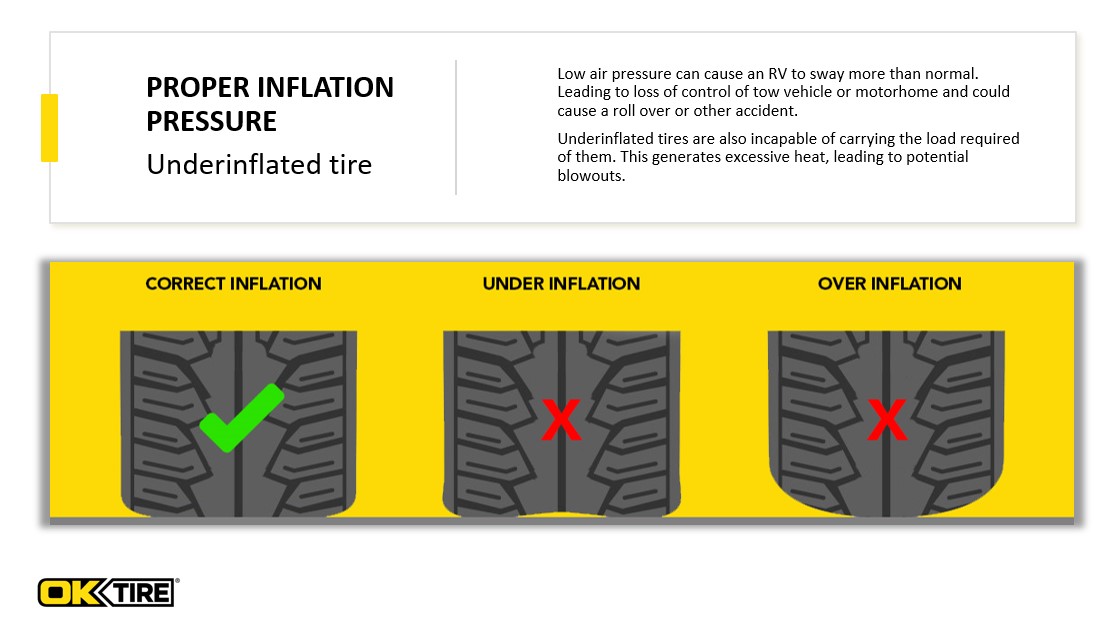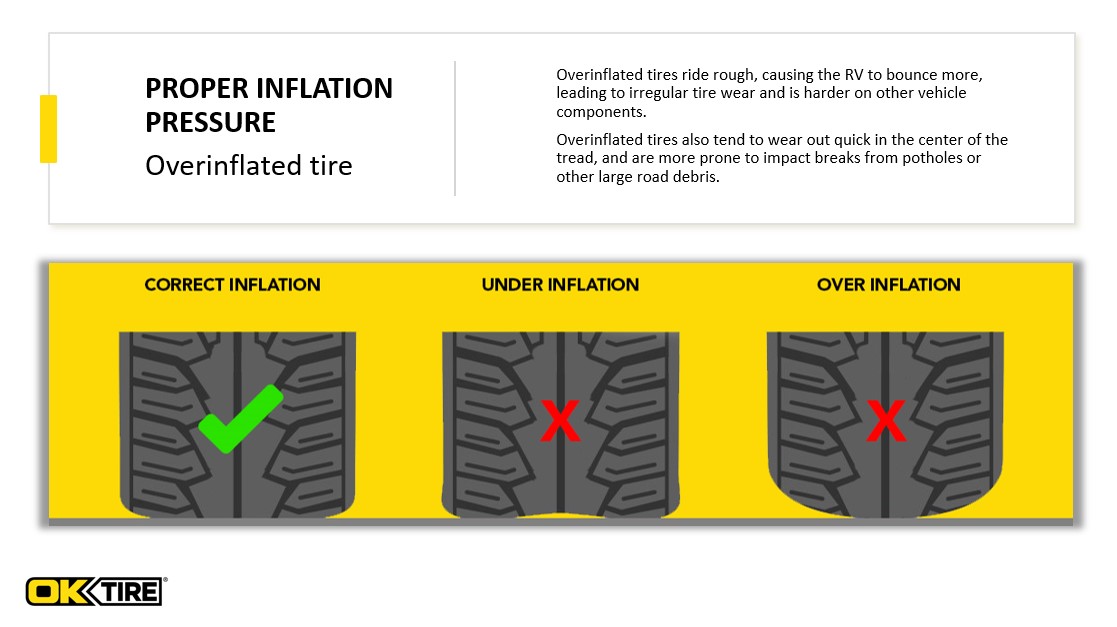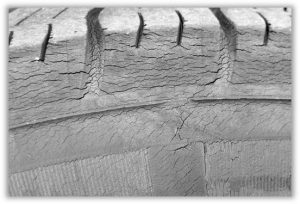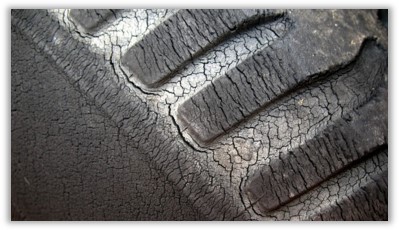By: Jim Pirie, Owner of OK Tire Woodstock, Ontario
Summer is fast approaching, and as the weather starts to warm up, most RV owners, eager for pandemic restrictions to lift, are beginning to prepare for hitting the road. As part of those preparations, it is essential to ensure your tires are in good condition.
Whether you’re a long-time RV enthusiast, or someone new to the RV experience, your tires are what will get you there, and bring you home safely. As tough as modern tires are, they need proper maintenance and care to provide the best performance and durability. To help you ensure your tires are in top shape for the season ahead, keep these maintenance tips in mind.
Check your tire pressure.
Before hitting the road, it is essential to ensure your tires have the proper air pressure. If you’re not sure how to check, refer to your vehicle manufacturer’s recommendations in your owner’s manual as improper tire pressure may have severe consequences. For example, low tire pressure generates heat within the tire, which can cause a tire blowout. A tire failure generally leads to significant and costly damage to your trailer, not to mention that it puts you, your passengers, and other drivers on the road at risk. Excess heat in your tires can transfer to your bearings, leading to grease issues and, as you can imagine, further unwanted damage.  An underinflated tire can put undue stress on your axles, especially if it’s a single axle, resulting in handling issues. If you have a tandem axle, you may not even notice or feel your underinflated tire, which puts your vehicle at risk of further damage.
An underinflated tire can put undue stress on your axles, especially if it’s a single axle, resulting in handling issues. If you have a tandem axle, you may not even notice or feel your underinflated tire, which puts your vehicle at risk of further damage.
To help prevent tire failure, each time you stop to fuel up or take a break, make sure you inspect your tires before getting back on the road. It’s as simple as walking around your vehicle or trailer and looking for signs of lower tire pressure, touching the tires to check for overheating, and visually comparing them to one another, looking for any differences between them. Often, doing this quick checkup will help you address any issues early on and help ensure you get to where you’re going safely.  Some newer truck models now come equipped with a tire pressure monitoring system (TPMS) specifically designed to read trailer tire pressure. A signal will warn you if at least one or more tires are significantly under-inflated, possibly creating unsafe driving conditions. You may need to purchase additional sensors for your trailer tires; this could be worth the cost if they help to avoid an unfortunate event. You should always visit your local auto service expert and have a certified technician perform the installation.
Some newer truck models now come equipped with a tire pressure monitoring system (TPMS) specifically designed to read trailer tire pressure. A signal will warn you if at least one or more tires are significantly under-inflated, possibly creating unsafe driving conditions. You may need to purchase additional sensors for your trailer tires; this could be worth the cost if they help to avoid an unfortunate event. You should always visit your local auto service expert and have a certified technician perform the installation.
Take the weight off your tires…
Once you’ve reached your destination, it’s good practice to ensure you stabilize your trailer or motorhome with stabilizer jacks, which will keep you level at the campsite and help relieve the weight on your tires axles, and suspension.
RV owners may have different preferences when parking their units for long periods – whether you prefer to completely lift the weight off the tires or leave them gently touching the ground. No matter your preference, what’s most important is to ensure you are relieving the weight on your tires and axles, and be mindful not to overburden your corner stabilizer jacks – it’s best to raise the RV, insert some solid blocks under the jacks to prevent indentations in the driveway, and let the wood absorb the weight. Always make sure you follow your manufacturer’s RV storage recommendations when it comes to raising the vehicle to relieve stress on the tires.
Protect your tires from the sun.
 After you’ve parked your RV, levelled and stabilized it, you will want to ensure your tires will not be exposed to direct sunlight for prolonged periods of time. Weather cracking can be seen on both the sidewalls and tread faces of tires and this is typically associated with the age of the tire and exposure to the elements. Tire covers can be a great way to protect your tires, but if you don’t have covers, there are other ways to shade the tires from the sun. Consider placing pieces of plywood over the tires or anything else that will keep them out of the direct sunlight.
After you’ve parked your RV, levelled and stabilized it, you will want to ensure your tires will not be exposed to direct sunlight for prolonged periods of time. Weather cracking can be seen on both the sidewalls and tread faces of tires and this is typically associated with the age of the tire and exposure to the elements. Tire covers can be a great way to protect your tires, but if you don’t have covers, there are other ways to shade the tires from the sun. Consider placing pieces of plywood over the tires or anything else that will keep them out of the direct sunlight.
When you park your RV, it is a good idea to roll your tires up onto wood or plastic blocks or patio stones. Keeping your tires out of the moist grass or dirt will prolong the life of the tire; over time, moisture from the ground can promote cracking or dry rot in your tires.
There are countless products available that claim to provide tire protection, however, it is important to thoroughly review the product before choosing to apply it to your tires. Conditioners or other shining products can impact the tire composition and promote dry cracking by accelerating the deterioration of the tire compound.
Change your tires every five years.
 Tires on an RV are often more subject to weathering than they are to accumulating high mileage. You have to be aware that tires need to be replaced every five years, not because they are worn out, but because they become too old. After five years, your tires are much more likely to deteriorate, and this can impact the vehicle’s safety when driving or towing an RV.
Tires on an RV are often more subject to weathering than they are to accumulating high mileage. You have to be aware that tires need to be replaced every five years, not because they are worn out, but because they become too old. After five years, your tires are much more likely to deteriorate, and this can impact the vehicle’s safety when driving or towing an RV.
By checking the date stamp on the tire, you’ll be able to know when they were manufactured and when you’ll need to replace them. This is very important when purchasing a used RV or trailer – you have to be aware of your tire’s overall condition – this is a very important precaution for preventing damage down the road.
Whether you are a new RV owner or a long-time enthusiast, it pays to ensure the good condition of your tires. Be sure to inspect each tire routinely. If you are not comfortable doing the inspection, take your vehicle to an OK Tire location or your local auto service provider, and they’ll gladly do it for you. Take a few minutes a day or two before you plan to hit the road, and give your tires the attention they need… it’s an essential element in your vehicle maintenance schedule, and an easy way to prevent tire failure.
Enjoy the road ahead!
About OK Tire
OK Tire is the largest independent tire and auto service retailer in Canada and has been part of the Canadian landscape since 1953. There are over 300 independently owned and operated OK Tire locations across the country. They offer a full range of services for all applications including passenger vehicle, light truck, RVs, trailers and more. Each location is unique, tailoring its offerings to meet customers’ needs and covering everything in, around, on or behind any vehicle. Customers receive nationwide warranties on automotive services and the personal service of a local owner/manager who lives in, shops in, and supports their community.
For more information visit www.oktire.com
The post The Importance of Protecting Your Tires – With OK Tire appeared first in RV Lifestyle Magazine.
The Article The Importance of Protecting Your Tires – With OK Tire appeared first on https://preciousrv.com
The Article The Importance of Protecting Your Tires – With OK Tire First Appeared ON
: https://gqcentral.co.uk





No responses yet